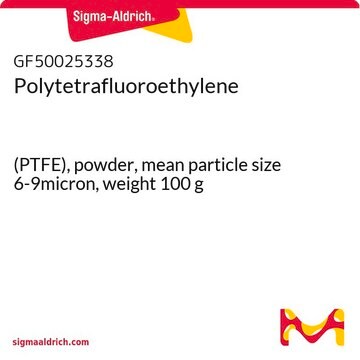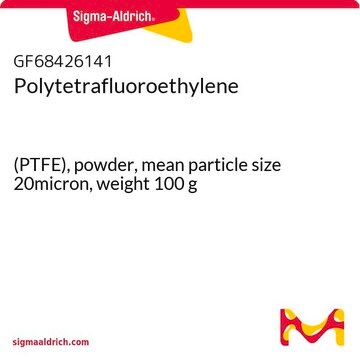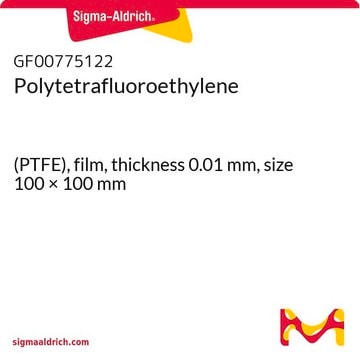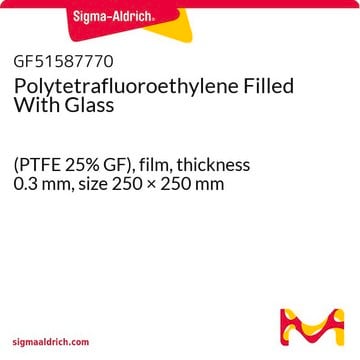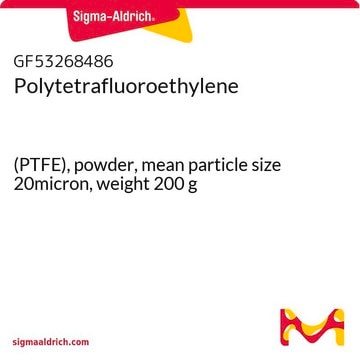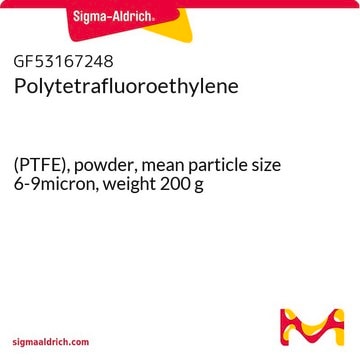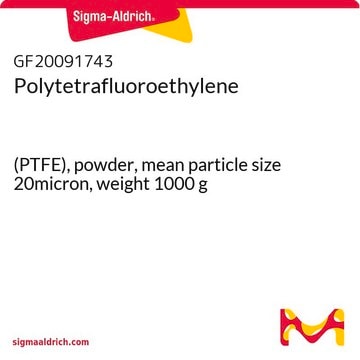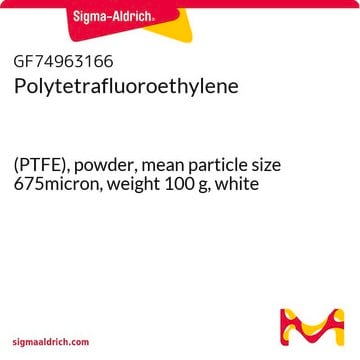665800
Polytetrafluoroethylene preparation
60 wt % dispersion in H2O
Synonym(s):
PTFE dispersion
Sign Into View Organizational & Contract Pricing
All Photos(3)
About This Item
Linear Formula:
(CF2CF2)n
CAS Number:
MDL number:
UNSPSC Code:
12162002
PubChem Substance ID:
NACRES:
NA.23
Recommended Products
concentration
60 wt % dispersion in H2O
Looking for similar products? Visit Product Comparison Guide
General description
PTFE is a synthetic fluropolymer of tetrafluoroethylene. It is a fluorocarbon solid, as it is a high molecular weight compound consisting wholly of carbon and fluorine. PTFE is hydrophobic in nature, it also has the lowest coefficient of friction against any solid.
Application
Owing to its chemical inertness and hydrophobicity, PTFE is widely used in surgical meshes, stents, grafts, and scaffolds for ligament repair. For example, expanded PTFE can be used to prepare vascular grafts.
The invariance of the dielectric constant over a wide frequency range and the high dielectric strength of PTFE makes it a suitable material for cable insulation and high-temperature energy storage application.
It can also be employed as an easy-cleaning, chemically inert, and non-stick coating in food, chemical and pharmaceutical industries.
The invariance of the dielectric constant over a wide frequency range and the high dielectric strength of PTFE makes it a suitable material for cable insulation and high-temperature energy storage application.
It can also be employed as an easy-cleaning, chemically inert, and non-stick coating in food, chemical and pharmaceutical industries.
Features and Benefits
- High chemical resistivity
- Low coefficient of friction
- Flexibility
- High thermal stability
Signal Word
Danger
Hazard Statements
Precautionary Statements
Hazard Classifications
Eye Dam. 1
Storage Class Code
10 - Combustible liquids
WGK
WGK 3
Flash Point(F)
Not applicable
Flash Point(C)
Not applicable
Personal Protective Equipment
dust mask type N95 (US), Eyeshields, Gloves
Certificates of Analysis (COA)
Search for Certificates of Analysis (COA) by entering the products Lot/Batch Number. Lot and Batch Numbers can be found on a product’s label following the words ‘Lot’ or ‘Batch’.
Already Own This Product?
Find documentation for the products that you have recently purchased in the Document Library.
Customers Also Viewed
How to Start a Polytetrafluoroethylene (PTFE) Business (Beginners Guide) null
Aldo Cannata et al.
The Annals of thoracic surgery, 95(5), 1818-1826 (2013-04-10)
Postsurgical intrapericardial adhesions are still considered an unavoidable consequence of cardiothoracic operations. They increase the technical difficulty and the risk of reoperations. The pathogenesis of postsurgical adhesions is a multistep process, and the main key players are (1) loss of
Hocine Bensaadi et al.
The American surgeon, 80(1), 57-65 (2014-01-10)
Funding received from Cousin Biotech, Wervicq Sud, France, and CR Bard Inc., Cranston, RI. The aim of this prospective randomized study was to determine the long-term recurrence and complication rates after small abdominal wall hernia repair with two different bilayer
W B Jawaid et al.
The British journal of surgery, 100(13), 1833-1837 (2013-11-15)
The anatomical defect in congenital diaphragmatic hernia (CDH) can usually be closed primarily but prosthetic patch repair may be required in newborns with a deficient diaphragm. High rates of patch failure and hernia recurrence (up to 50 per cent) have
Katherine R Kozak et al.
Lab on a chip, 13(7), 1342-1350 (2013-02-06)
Miniaturization of immunoassays has numerous potential advantages over traditional ELISAs. Here we present a novel approach using patterned planar plates (PPPs). These 'wall-less' plates consist of a 16 × 24 array of 2 mm diameter hydrophilic regions surrounded by a
Our team of scientists has experience in all areas of research including Life Science, Material Science, Chemical Synthesis, Chromatography, Analytical and many others.
Contact Technical Service

![Poly[4,5-difluoro-2,2-bis(trifluoromethyl)-1,3-dioxole-co-tetrafluoroethylene] dioxole 87 mol %](/deepweb/assets/sigmaaldrich/product/structures/951/320/21327fcd-4960-402d-8ae1-bf2e379cb2e2/640/21327fcd-4960-402d-8ae1-bf2e379cb2e2.png)
